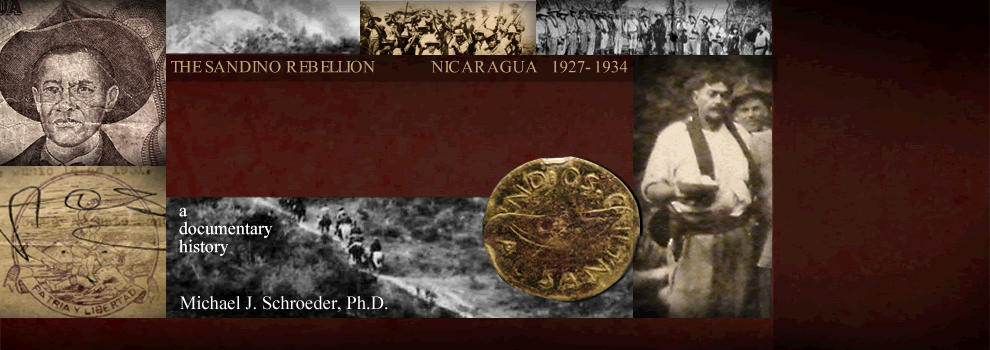|
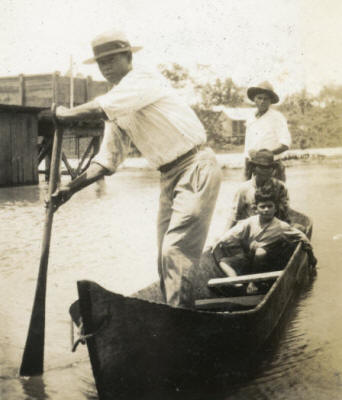 THIS IS THE FIRST PAGE
of documents for the second HALF of 1928 on
Nicaragua's Caribbean Coast region, housing materials
dated during the month of
July.
THIS IS THE FIRST PAGE
of documents for the second HALF of 1928 on
Nicaragua's Caribbean Coast region, housing materials
dated during the month of
July.
We learn here that
Sandino exercises much influence in
the Upper Coco & Bocay River
valleys, and glean important details
about the interior districts, for
instance that the inhabitants in the
La Luz / Siuna area are "mostly Nicaraguans,
very few Indians," that popular
sentiments regarding Sandino in
Wuani (pop. 50) and Siuna (pop. 110)
are split, and that "in the vicinity
of Siuna large numbers of people are
engaged in washing gold from Suina
Creek" (8 July Intel Report, Hall;
there are many reasons to consider
most such bits of military
intelligence mostly credible).
In addition to these kinds of
revealing tidbits, we also see
several penetrating analyses by
highly placed US actors, including the 9-page July 31 report of
Walter Wilgus, a member of Gen.
Frank McCoy's electoral team then
engineering the upcoming November
national elections.
Notable too is Admiral D. F.
Sellers' 15-page "Summary of
Activities [&] Present Conditions in
Nicaragua" of July 11, which
provides a fine synopsis of the
strategic & tactical thinking of one
of the main architects of the
intervention; especially helpful are
the sections on the "Eastern Area"
(defined open-endedly as "such
territory as can be controlled by
troops supplied from the East
Coast," including the Bocay River
Valley & Upper Río Coco; this
15-pager can be fruitfully read
alongside Sellers' follow-up 6-page
report of July 21, "Affairs in
Nicaragua"). Combined with the other reports,
letters & radiograms, we get a
pretty solid & nuanced sense of
the region's ongoing social &
political dynamics.
|
|
PERIOD MAPS
|
|
1894 mosquito
shore

27 MB,
library of congress
|
1920s
Standard Fruit

6.5 mb,
US National archives
|
1928 Rio wanks
Patrol

3 mb, us
national archives
|
1931 Moravian

2.4 mb,
coMENius press
|
|

|
5 July 1928
(1200).
Radiogram from Major H. H. Utley, Puerto
Cabezas, to Gen. Feland, Managua.
"DAILY
REPORT STOP REPORTS RECEIVED FROM EL
GALLO THAT BOTH GRANDE AND HIYAS RIVER
VALLEYS WERE QUIET COMA NO BANDIT RUMORS
COLON GRANDE RIVER REPORTED QUIET FROM
RIO BLANCO TO EL GALLO COMA MARINES
REPORTED NEAR RIO BLANCO STOP FOLLOWING
FROM WASPUC FROM INDIANS WHO CLAIMED TO
HAVE BEEN AT SANDINOS CAMP JUNE NINETEEN
COLON SANDINO THREE DAYS UP BOCAY RIVER
FROM BOCAY WITH THREE TO FIVE HUNDRED
MEN COMA HAVE TRAILS TO MATAGALPA COMA
HIYAS COMA AND TO EAST COMA PLANES
REPORTED AS HAVING PASSED OVER CAMP SITE
SEVERAL TIMES BUT OUTLAWS HID COMA
SANDINO REPORTED PRESENT IN PERSON STOP
MY INTENTION IS TO BLOCK ROUTES INTO
HONDURAS AT LEAST AS FAR UP WANKS AS
POTECA BEFORE ADVANCING UP BOCAY RIVER
STOP EXPECT TO OCCUPY POTECA ABOUT FIRST
OF AUGUST STOP 1200."
|
|
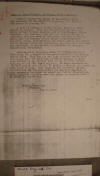
|
6 July 1928.
Claim by James Hibbert of Bilway, Puerto
Cabezas, to British Legation, Managua.
"Hibbert claims
the amount of the doctors bills for
treatment of Mrs. Hibbert’s injuries,
plus $224.00 for damage to property &c.
¶ A copy of Hibbert’s letter to N.M.
Consul at Bluefields is annexed. This
was furnished by Mr. Rees on March 10
last to this Legation and to the
Foreign, Office (London). Mr. Patteson,
who was then British Charge d’Affaires,
does not seem to have taken the case up
but on April 21st the Foreign office
cables instructing H.M. Legation, after,
investigating the claim, adding the
amount of the doctors bills and
eliminating any portions which cannot
reasonably be maintained, to endeavor to
arrange a satisfactory settlement. ¶ H.
M. Legation thereupon asked the British
Consul at Bluefields for a report on the
points raised in the Foreign office
cable. This has not yet been received
and Mr. Rees now states that the
gentleman at Puerto Cabezas on whose
good offices he was relying left on his
vacation without replying to his (Mr.
Rees) enquiry. In these circumstances
Mr. Rees states that he will be unable
to forward the report for some weeks to
come. H.M. Legation has therefore
thought it better to lay the case before
the American Legation at once reserving
the right to submit any further
observations which may seem requisite
when the report is received from H.M.
Consul at Bluefields. ¶ British
Legation, ¶ Managua, ¶ July 6, 1928."
|
|

|
7 July 1928
(1955).
Radiogram from Major H. H. Utley, Puerto
Cabezas, to Gen. Feland, Managua.
"DAILY
REPORT STOP LIEUT COOK DEPARTED ZERO
FOUR THIRTY WITH FORT FIVE ENLISTED
MARINES FIFTY NINTH COMPANY COMA THREE
ENLISTED MARINES GALVESTON DETACHMENT
AND ONE NAVY ENLISTED FOR DUTY ON WANKS
RIVER STOP 1955"
|
|
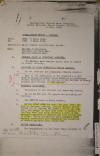
|
8 July 1928.
Intelligence Report, General, 17 June-7
July, Lt. W. C. Hall, Puerto Cabezas, p.
1.
"References:
Daily reports covering time period. ¶
Maps: Ham Map of Nicaragua. ¶ Christian
Brothers Map. ¶ Moravian Mission Map. ¶
A. GENERAL STATE
OF TERRITORY OCCUPIED. ¶ The
Eastern Area remains quiet, with no
rumors of bandit activity. ¶ B.
ATTITUDE OF CIVIL
POPULATION TOWARD MARINES. ¶ 1.
In the interior the population remains
neutral. ¶ 2. Many of the population in
the interior are pro Sandino either by
nature or by force of circumstances.
Careful treatment of the natives by the
marines is slowly guiding this feeling
to ‘pro marine’. ¶ C.
ECONOMIC
CONDITIONS. ¶ 1. Conditions in
the interior are improving slowly. ¶ 2.
In the LA LUZ area people are gradually
returning. ¶ 3. The NEPTUNE mine is
being worked. ¶ 4. [section transcribed
on website] ¶ D.
POLICE OPERATIONS. ¶ 1. The
Commandantes in the coast towns continue
to . . ."
|
|
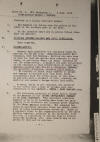
|
8 July 1928.
Intelligence Report, General, 17 June-7
July, Lt. W. C. Hall,
Puerto Cabezas, p. 2.
" . . . function
in a fairly efficient manner. ¶ 2. The
Guardia are taking over the police of
the towns in the southern part of the
area. ¶ 3. In the interior there are no
police forces other than the marines. ¶
E. FRICTION
BETWEEN MARINES AND CIVIL POPULATION.
¶ None reported. ¶ F.
MISCELLANEOUS
¶ 1. Captain Rose submitted the
following notes regarding the LA LUZ
area: Inhabitants mostly Nicaraguans,
very few Indians. Natives who have been
in bush for last two months have
returned to their homes, in particular
Wuani and Siuna contains 50 and 110
respectively. I suspect the most
influential of the citizens in this
neighborhood of being pro Sandino - -
looking upon him as a liberator; however
the majority, I believe, consider him a
bandit. ¶ In vicinity of Siuna large
numbers of people are engaged in washing
gold from Siuna Creek. Considerable gold
but little money in this area. La Luz
mine made a shipment of food, clothing
and medicine and opened a bodega within
last month. ¶ 2. A rumor, which is not
credited, was received to the effect
that a band of outlaws were
concentrating in the SACKLIN – CRUTA –
CAPE GRACIAS area. ¶ 3. The following
quotation is taken from a letter of the
Manager of the CORTES DEVELOPMENT
COMPANY of LA LIMA, HONDURAS: ‘The
political situation appears to us to be
becoming more acute due principally to
an extensive mud slinging press campaign
by the three parties involved. The
campaign has taken an extremely personal
trend and public sentiment is being
correspondingly worked up. There is a
movement afoot to get representatives of
the three parties together, probably by
the executive, with the idea of
requesting or forcing them to
discontinue mud slinging, etc. Good
results may be expected if this end is
obtained. . . . "
|
|
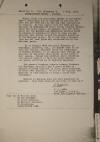
|
8 July 1928.
Intelligence Report, General, 17 June-7
July, Lt. W. C. Hall, Puerto Cabezas,
p. 3.
" . . . ¶ Though
there are persistent rumors to the
effect that a revolution can be expected
at any time we have not yet been able to
see any real indications of trouble. It
will appear that the arms and ammunition
in Honduras are about evenly divided
amongst those who might clash. It
appears that the candidates for the
Liberal and Republican parties would be
willing to renounce in favor of some one
man provided this person is not the
present candidate of the National party.
Up to now such a proposition has not
been given any consideration by the
national party. ¶ It is thought that the
exile Liberals in Guatemala, Salvador,
etc., are almost sure to invade the
country, possibly under the leadership
of General Ferrera, if it appears that
through imposition at the polls their
party is not given a fair chance. Though
the Liberals state otherwise the general
opinion is that the exile Liberals are
poorly outfitted as to fighting
material. ¶ The present boundary dispute
between Honduras and Guatemala naturally
has a great effect on present politics
here and is being taken advantage of
wherever possible. We are of the opinion
that Honduras is very anxious to avoid a
clash with Guatemala. ¶ Sandino is
getting more and more adherents in
Honduras – they find excellent material
to work on. ¶ W. C. Hall, ¶ 1st Lieut.,
U.S.M.C., ¶ Area Intelligence Officer."
|
|

|
10 July 1928
(0145).
Radiogram from Major H. H. Utley, Puerto
Cabezas, to Gen. Feland, Managua.
"8610 CAPTAIN
LINSCOTT COMA FIFTYSIX ENLISTED MARINES
AND ONE ENLISTED NAVY DEPARTED PUERTO
CABEZAS FOR CONCEPTION AREA 0145"
|
|
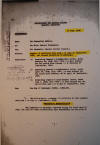
|
1.
11 July 1928.
"Summary of Activities from June 1 to
July 10 and Present Conditions in
Nicaragua," Admiral D. F. Sellers,
Managua, to USMC Major Gen. Commandant
J. Lejeune, p. 1.
"References: (a)
Commanding General’s Confidential
letter, dated February 28, 1928, File
‘995’, re this subject for the period
from January 15 to February 27
(inclusive), 1928. ¶ (b) Commanding
General’s Confidential letter, dated
April 20, 1928, file ‘995’, re this
subject for the period from February 28
to April 18 (inclusive), 1928. ¶
Commanding General’s Confidential
letter, dated June 1, 1928, File ‘995’
re this subject for the period from
April 19 to May 31 (inclusive), 1928. ¶
Map: Ham Map of Nicaragua (1924),
1:500,000. ¶ 1. The following is a
summary of activities by this command
from June 1 to July 10 (inclusive),
1928. ¶ TERRITORIAL REORGANIZATION. ¶
The increases of personnel expected
during the first half of July, the plan
for their distribution upon debarkation
and the plan to . . . "
|
|
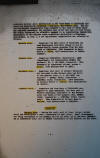
|
2.
11 July 1928.
"Summary of Activities from June 1 to
July 10 and Present Conditions in
Nicaragua," Admiral D. F. Sellers,
Managua, to USMC Major Gen. Commandant
J. Lejeune, p. 2.
". . . establish
several small detachments in the
department of CHONTALES dictated the
decision to establish a new Area, the
Western Area. Had the old territorial
organization been retained in the face
of these plans and expected increases,
the Southern Area would have had too
many troops too widely dispersed for
effective command in an organization
immediately subordinate to the Brigade
under conditions prevailing in
Nicaragua. Accordingly, on July 1, a new
territorial organization was affected as
follows: ¶
Eastern Area: - Comprises the
East Coast of NICARAGUA and such
Nicaraguan territory Inland as can be
controlled by troops supplied from the
East Coast of NICARAGUA. (Now Commanded
by Major Harold E. Utley, with
Headquarters at PUERTO CABEZAS). ¶
Western Area
– Comprises CHINANDEGA (Department),
LEON (Department) and Southwestern
ESTELI (Department) by Lieutenant
Colonel Lauren S. Willis, the
Headquarters at LEON). ¶
Northern Area
– Comprises that part of Western
NICARAGUA NOT included in the Western
Area and North of the general line, S.J.
DE LIMAY (exclusive) – ESTELI (City)
(inclusive) – JINOTEGA (City)
(exclusive). (Now Commanded by Colonel
Robert H. Dunlap, with Headquarters at
OCOCTAL.) ¶
Southern Area – Comprises the
territory of NICARAGUA contingent to
LAKE NICARAGUA, and that part of Western
Nicaragua (exclusive of the Western
Area) and South of the general line,
ESTELI (City) (exclusive) – JINOTEGA
(City) (inclusive). (Now Commanded by
Colonel Rush B. Wallace, with
Headquarters in MANAGUA.) ¶
OPERATIONS ¶
Eastern Area:
- During the early part of June, troops
reached BOCAY and established a small
detachment at that place. Small
detachments are being maintained in the
MINERAL DE PIS PIS Area, at LA LUX Mine
(MINERAL DE LA COECKPCION Area) and at
BUCBUC (confluence of RIO WASPOOK and
RIO COCO). . . . "
|
|
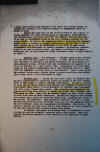
|
3.
11 July 1928.
"Summary of Activities from June 1 to
July 10 and Present Conditions in
Nicaragua," Admiral D. F. Sellers,
Managua, to USMC Major Gen. Commandant
J. Lejeune, p. 3.
" . . . A small
force from LA LUX advanced on the main
trail towards CASULI and reached the
vicinity of the Western Boundary of
PRINZAPOLKA about the middle of June. ¶
During the early part of the period
covered by this report, it became
apparent that from considerations of
importance, practicability and
effectiveness, operations well into the
interior from the East Coast to be kept
up indefinitely would be the most
desirable activity for the coming
autumn. On June 9, the Commanding
General instructed the Commander,
Eastern Area, to prepare to conduct
operations up the RIO COCO as far as
NUEVA SEGOVIA and up the RIO PRINZAPOLKA
to the limit of small boats.
Arrangements have been made for special
equipment, particularly outboard motors
to be used on native boats; and plans
are perfected by which a detachment will
be established at POTECA (Northeast
corner of NUEVA SEGOVIA) by August 1. ¶
Southern Area:
- The MATAGALPA – JINOTEGA agricultural
district has been free even from rumors
of outlaws. At TUMA (about 18 miles, air
line, Northeast of MATAGALPA) the Marine
Detachment has been placed on a
semi-permanent status, provided with
some conveniences and supplied to as to
be now suitable for a small patrol base.
Detachments have been established at SAN
CARLOS (Southeastern end of LAKE
NICARAGUA) and at S. FRANCISCO DEL
CARNICERO (on North shore of LAKE
MANAGUA). After a rest period, the
mounted Platoon under Captain Phipps is
again patrolling from GUASACA (not on
Map; about 12 miles Northeast of TUMA).
¶ Northern Area:
- During the last week of May, it
appeared that the main concentration of
guerilla forces had formed in the wild
country North of PENA BLANCA in Central
JINOTEGA (Department). On June 1, a
force of about 125 men (Major Rockey)
from QUILALI and a Company of about 90
men from CORINTO Ranch (about 10 miles
Northeast of JINOTEGA) were dispatched
into this almost inaccessible region.
This operation was attended by intensive
patrolling from QUILALI, S. RAFAEL DEL
NORTE, YALI, JINOTEGA, CORINTO Ranch and
TUMA. There were NO contacts except one
small patrol affair in which there were
NO known casualties. The marines
employed were divided into several small
groups by which the entire area,
including the valley of the RIO CUA, was
patrolled. This operation lasted for
over two (2) weeks during which there
was daily torrential rain, and our men
negotiated some of the most difficult
trails yet encountered in NICARAGUA. The
return of the troops to QUILALI was held
up by the RIO COCO which was in flood,
whereupon, the men were supplied with
rations dropped from planes. ¶ In
general, throughout the Northern area, a
continuation of patrolling has been the
principal operation during this period.
There has been NO appreciable decrease
in this activity in the Department of
NUEVA SEGOVIA. . . . "
|
|
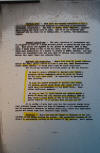
|
4.
11 July 1928.
"Summary of Activities from June 1 to
July 10 and Present Conditions in
Nicaragua," Admiral D. F. Sellers,
Managua, to USMC Major Gen. Commandant
J. Lejeune, p. 4.
" . . .
¶
Western Area:
- This Area was created effective on
July 1. Operations therein have been
confirmed to patrolling in Northwestern
CHINANTEGA (Department). The band of
Ortes, alias ‘Perrara’, appeared there
during the early part of June; but it is
not believed that ‘Perrara’ and his band
are in hiding near, or across, the
Honduran border. ¶
Present
Operations: - The only operation
of consequence now in progress is that
of a large mounted patrol of about 40
men from QUILALI. This patrol was
sighted by our planes at GUIGUILY (Not
on Map; about 8 miles North of CUA on
the RIO COCO) June 10. The outlaws have
shown many indications of a desire to
return to NUEVA SEGOVIA; and this patrol
was dispatched into the area East of
QUILALI upon reliable information that
small bands had returned there. ¶
Contacts and
Casualties: There have been NO
ground contacts except the small patrol
affair on June 6 near STA. CRUZ
(Southeastern corner NUEVA SEGOVIA) in
which there were NO known casualties. ¶
The following contacts have been gained
by the Air Service: ¶ On June 5, planes
attached to Eastern Area bombed a
prepared outlaw rendezvous about 50
miles up (South) the RIO COCO from
BOCAY. NO casualties to personnel were
observed. ¶ On June 14, planes attached
to Eastern Area bombed and machine
gunned about forty (40) armed outlaws on
rafts near the headwaters of the BOCAY
River. Casualties inflicted, unknown. ¶
On July 6, one (1) plane bombed and
machine gunned a group of about ten (10)
outlaws near GUIGUILI (NOT on Map) about
8 miles North of CUA on the RIO COCO);
observed reports ‘It is certain that one
man was hit’. ¶ It is worthy of note
that only the few contacts stated above
were obtained though there has been NO
decrease in Air reconnaissance and NO
appreciable decrease in Ground
Patrolling, which from experience gained
has become much more effective than
before. ¶
Aviation: - There has been NO
change or decrease in the activities of
our planes during the period. The
persistent presence of our planes is
undoubtedly telling on the morals of the
outlaws. Small groups . . . "
|
|
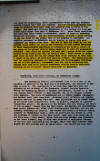
|
5.
11 July 1928.
"Summary of Activities from June 1 to
July 10 and Present Conditions in
Nicaragua," Admiral D. F. Sellers,
Managua, to USMC Major Gen. Commandant
J. Lejeune, p. 5.
" . . . are
observed occasionally under
circumstances which made our aviators
morally certain that they are outlaws;
but our aviation personnel continue to
withhold fire until arms are actually
seen or fired at the planes. The
excellent airplane discipline of the
Outlaws has been commented upon before
(See page 4, Reference ‘c’). Under these
conditions, for each case where attack
is warranted, scores of hours of
hazardous flying are necessary. Any new
instrumentality produces a great feeling
of awe and dread in the people whom we
are seeking to encounter; our aviation
personnel in NICARAGUA can be trusted to
employ with good judgment any weapon
given them. The use of TEAR GAS BOMBS by
our Air Service would enable our pilots
and observers to take human advantage of
their unprecedented experience in
estimating the hostile nature of any
group on the ground without being
compelled to wait for conclusive
evidence; they could not against the
many small groups which are almost
certain to be hostile but with NO
visible arms; their errors in judgment
would be very few and any damage they
could possibly do with such a weapon
would entail NO permanent physical
effect. The Commanding General has
carefully balanced all advantages and
disadvantages attending the use of this
chemical, recommends that its use be
authorized and affirms that same would
produce tremendous results towards
absolutely clearing up the so-called
‘Bandit Situation’ in NICARAGUA. ¶
INSPECTION, East Coast Stations, by
COMMANDING GENERAL
¶ The Commanding General left MANAGUA
June 18 on a tour of inspection of
stations on the East Coast of NICARAGUA,
and returned to MANAGUA on July 8. The
opportunity to perform this important
duty was afforded by the courtesy of the
Commander, Special Services Squadron.
During the Commanding General’s absence
from MANAGUA, Colonel R. H. Dunlap
(Second Senior Officer in this Brigade)
was at the Brigade Command Post,
MANAGUA. The posts at BLUEFIELDS and at
PUERTO CABEZAS (Headquarters Eastern
Area) were inspected; prominent civil
officials and representative American
citizens were met. Near BLUEFIELDS and
at PUERTO CABEZAS are large labor
populations; each, in general, composed
of ignorant susceptible people, the
Marines in the Eastern Area are winning
the trust of this element. Inland from
the East Coast, the Marines are
encountering many native Indians who,
after first showing great timidity, are
now confidently assisting our patrols.
The wanton destruction of certain mining
property in PRINZAPOLKA (April, 1928) by
guerillas has served to lower the
prestige of Sandino on the East Coast;
such acts have shown him in his true
role, a mere bandit, which fact has been
brought home forcibly to the labor
element, many of whom were deprived of
employment thereby. At the time this
destruction was wrought, there were many
laborers unemployed who were seeking
work in those mines; the result has been
that . . . "
|
|
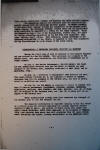
|
6.
11 July 1928.
"Summary of Activities from June 1 to
July 10 and Present Conditions in
Nicaragua," Admiral D. F. Sellers,
Managua, to USMC Major Gen. Commandant
J. Lejeune, p. 6.
" . . . these
people realize that Sandino and Banditry
are their economic enemies.¶ The
Commanding General was satisfied with
his inspection and greatly pleased with
the knowledge directly gained. At PUERTO
CABEZAS, it was noted that, largely
through the cooperation of the Bragman
Bluff Lumber Company, the building
recently erected there are far beyond
what would reasonably be expected as a
return for the money expended. While the
Commanding General was at the
Headquarters, Eastern Area, the plans
for further extending operations up the
RIO COCO were completed. (See under
‘Eastern Area’, above). This extension,
taking advantage of the increased
navigability of the rivers, is expected
to more than compensate for any
disadvantages to us by reason of the
rainy season. ¶
DISTRIBUTION OF INCREASED
PERSONNEL RECEIVED and EXPECTED
¶ During the first week of July an
increase of two hundred officers and men
arrived via the USS BRIDGE; this
personnel was assigned to the Eastern
Area; and, upon debarkation, was
stationed at BLUEFIELDS and at PUERTO
CABEZAS. ¶ On July 6, the Marine
Detachments, USS NEW MEXICO, USS IDAHO
and USS PENNSYLVANIA debarked from the
USS NITRO at CORINTO and were assigned
to the Western Area, initially stationed
at LEON (City) and at CHINANDEGA (City).
¶ On July 12, a Battalion of Bluejackets
(286 Officers and men), from Light
Cruiser Division No. 3, are expected to
debark at CORINTO, whereupon they will
be assigned to the Western Area, and
held as nearly intact as conditions may
permit. ¶ On July 14, the USS MEDUSA is
expected to arrive at CORINTO with nine
(9) Marine Detachments (CALIFORNIA,
COLORADO, ARIZONA, TENNESSEE,
MISSISSIPPI, MARYLAND, WEST VIRGINIA,
NEW YORK, PROCYON); four (4) of which
will be assigned to the Southern Area,
and five (5) of which will be assigned
to the Western Area. ¶ These
distributions already made have
increased the strength of the Eastern
area to over 700 officers and men. ¶ The
complete distribution of expected
incoming troops will build up a reserve
along the railroad replacing the already
depleted reserve created at LEON in
April. The arrival of these troops will
enable the entire Second Battalion,
Fifth (5th) Regiment, to be assembled at
GRANADA (City) and vicinity from where
they will establish five (5) small
detachments (including SAN CARLOS,
already established) on the CHONTALES
shore . . . "
|
|
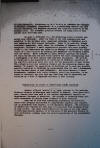
|
7.
11 July 1928.
"Summary of Activities from June 1 to
July 10 and Present Conditions in
Nicaragua," Admiral D. F. Sellers,
Managua, to USMC Major Gen. Commandant
J. Lejeune, p. 7.
" . . . of LAKE
NICARAGUA; furthermore we will be able
to increase the strength in Northern
CHINANDEGA (Department) as a
precautionary measure and move the few
remaining 11th Regiment personnel now
along the railroad the Northern Area.
All movements possible toward the
completion of this general plan have
been made. ¶ On page 6, Reference (b),
the Commanding General briefly commented
upon CHONTALES. After the walk of the
11th Regiment had been committed to the
Northern area, organized outlawry in
CHONTALES would have undermined this
Brigade seriously. Today it is possible,
though considered improbable, that,
under the influence of Chamorro or some
unscrupulous ‘Politico’ a small
organization provided with arms probably
hidden in that department may arise in
an attempt to embarrass the supervision
of a fair election by roaming over
CHONTALES and avoiding contact with our
forces. Those elements in Latin America
opposing the purpose for which the
Marines are here would distort the facts
accompanying such a contingency into
most vicious anti-American propaganda.
The problem of assisting in the
supervision of elections in CHONTALES
regardless of any guerrilla uprising
there will call for the employment of
many troops. This situation has been
carefully studied and the Commanding
General has decided ‘To prepare for
supervision of elections and to meet any
possible guerrilla uprising in CHONTALES
by establishing five (5) small
detachments on the Northern shore of
LAKE NICARAGUA’. The establishment of
these detachments, combined with active
friendly patrolling therefrom, is
expected to forestall any plan that may
have been made to embarrass the
elections by a show of organized
violence in that vicinity. ¶
PREPARATIONS TO ASSIST IN SUPERVISING
COMING ELECTIONS ¶ Several officers (mostly U.S. Army)
attached to the American Electoral
Mission in Nicaragua have arrived in
MANAGUA. From these officers, details
have been made to the various
Departmental Capitals as Departmental
Chairmen of Elections. The Brigade is
rendering every possible assistance in
getting these officers to their
stations. ¶ Such men as have been
undergoing instructions for electoral
duties were promptly distributed to
Departmental Capitals upon request, and
in accordance with desires, of the
Electoral Mission. The selection of
further men required for this duty is
being made from incoming troops as they
arrive; and their distribution will be
made in the same manner. At each
Departmental Capital, it is the plan of
the Electoral Mission to have
instruction continue under the direct
supervision of the Departmental Chairmen.
. . . "
|
|
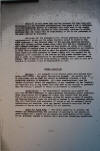
|
8.
11 July 1928.
"Summary of Activities from June 1 to
July 10 and Present Conditions in
Nicaragua," Admiral D. F. Sellers,
Managua, to USMC Major Gen. Commandant
J. Lejeune, p. 8.
" . . . ¶ While it
is well known that the men selected for
this duty will NOT possess all the
desirable qualifications (See pages 6
and 7, Reference ‘c’), the Commanding
General is confident that their work in
the coming elections will be so far
superior to that previously performed by
native civilians that the result will be
satisfactory so far as the personnel of
the Naval Service is concerned. ¶ Our
plans for the strength of the various
garrisons during the registration of
voters and the actual election should be
based on very exact knowledge of the
detailed plans of the American Electoral
Mission. There will be many polling
places where there will NOT be a
detachment of this command stationed;
some such polling places, no doubt, will
require detachments of varying sizes to
be present during registration and
election. In order that we might be able
to give the greatest possible
assistance, these views have been
presented to General McCoy with the
request for information as to location
of the various polling places decided
upon. On July 8, 1928, in a
communication to the Commanding General,
General McCoy stated, ‘This matter is
now being carefully studied, and just as
soon as a decision is reached it will be
communicated to you’. ¶
FUTURE
OPERATIONS ¶
Mission: -
All elements of our mission which have
existed heretofore still exist. The
actual mission has changed; our mission
now it TO FACILITATE, AND IN EVERY WAY
ASSIST IN RENDERING POSSIBLE, A FAIR
SUPERVISED ELECTION IN NICARAGUA. All
other considerations, even the ‘Bandit
Situation’ itself and regardless of any
‘comeback’ by the ‘bandits’, are
important only to the extent that they
bear on our ability to prosecute this
one result, a promise to which our
government is committed. ¶
Dispositions:
- Our dispositions (existing and
planned) are such that NO other
permanent or semi-permanent detachments
appear necessary. Those dispositions are
bringing our troops into contact with
the great bulk of the population of
Nicaragua, giving the people a sense of
security and denying important towns and
productive regions to the remaining
outlaws. They will facilitate such
employment of troops as may be necessary
during registration and election; also
any special situation requiring the
employment of troops can be met readily
by our reserves. ¶
Plans for field
duty: - The outlaw situation at
present, the weather and communications,
the necessity of adhering to our mission
as above defined and a regard for the
health and continuation of the morale of
our personnel combine to dictate that
operations resembling expeditions . . .
"
|
|
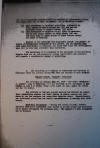
|
9.
11 July 1928.
"Summary of Activities from June 1 to
July 10 and Present Conditions in
Nicaragua," Admiral D. F. Sellers,
Managua, to USMC Major Gen. Commandant
J. Lejeune, p. 9.
" . . . into wild
mountainous regions should be resorted
to infrequently during the coming three
(3) or four (4) months. It is therefore
planned: ¶ (a) Each detachment to
continue patrolling ordinarily by small
groups of NOT to exceed ten (10) men and
for distances rarely to exceed fifteen
(15) miles. ¶ (b) Each detachment to
maintain at all times in readiness, one
or more larger groups of about twenty
(20) men for field duty on quick notice
of armed outlaws within the limit of
mobility. ¶ Because of the knowledge and
experience gained, the gradual increase
of friendliness evidence by the natives,
and the greater care with which
information is obtained, our field work
under the above general plan will be
even more effective than heretofore. ¶
The assistance to be rendered to the
personnel of the Electoral Mission from
now on, and especially during
registration and election will require a
considerable amount of patrolling. ¶ 2.
The following is a summary of conditions
now existing in Nicaragua which are
closely associated with the mission of
this Brigade: ¶
PRESENT
OUTLAW, ‘BANDIT’, SITUATION
¶ The surrender of Sevilla (May
30, 1928 – See under ‘TRINADAD – S.
ISIDRO’, page 3, Reference ‘c’) was
followed by the surrender of HERNANDEZ
on June 8 at ESTELI (City) with eight
(8) men, eight (8) rifles and one (1)
pistol. ¶ The attitude of Outlaws
towards meeting the Marines in combat,
their diminishing numbers and their
hiding in remote regions are well shown
by the few contacts and casualties
reported above. Unquestionably our
persistent patrolling and aerial
reconnaissance are wearing down their
morale. ¶
Hand-bill Propaganda: - During
the middle of June, several thousand
hand-bills (unsigned) were posted by
ground troops and distributed by planes
throughout the Northern Area. The
English of this propaganda was as
follows: . . . "
[NOTE:
See
M-DOCS > HOJAS VOLANTES for
high-resolution digital copies of
this & other propaganda handbills.]
|
|
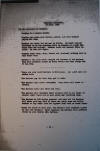
|
10.
11 July 1928.
"Summary of Activities from June 1 to
July 10 and Present Conditions in
Nicaragua," Admiral D. F. Sellers,
Managua, to USMC Major Gen. Commandant
J. Lejeune, p. 10.
" . . . ¶ MANAGUA,
NICARAGUA, ¶ 18 June, 1928. ¶ ‘To the
Followers of Sandino: ¶ ‘Sandino is a
Common Bandit. ¶ ‘Sandino has taken your
horses, cattle, and food without paying
for them. ¶ ‘Sandino has never led his
men in battle. He sends out his
followers to do the fighting while he
remains at a safe distance from the
bullets. Sandino talks and spreads false
reports. He does not fight. ¶ ‘Sandino
makes many, many boasts and promises;
nothing that he says comes true. ¶
‘Sandino’s men have never stopped the
advance of the Marines, they have
suffered losses in every battle and then
always had to run away. ¶ ‘There are
over 4,000 Marines in Nicaragua; and
1,000 more are coming soon. ¶ ‘The
Marines pay for what they get in cash. ¶
‘The Marines have never retreated; they
never will cease to advance. ¶ ‘The
Marines never get tired and stop. ¶ ‘The
Marines will continue their present work
in all kinds of weather until there are
no more armed men resisting them. ¶ ‘The
Marines do NOT injure peaceful citizens
but the Marines will never give any rest
to those who carry arms and follow
Sandino or any other Jefe who opposes
them with an armed force. ¶ ‘Since the
first of this year, the Marines have
suffered losses in only two battles;
those opposing the Marines have suffered
losses in over thirty (30) battles . . .
"
|
|
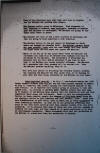
|
11.
11 July 1928.
"Summary of Activities from June 1 to
July 10 and Present Conditions in
Nicaragua," Admiral D. F. Sellers,
Managua, to USMC Major Gen. Commandant
J. Lejeune, p. 11.
" . . . ‘None of
the airplanes have ever been shot down
by Sandino and the Marines are getting
more planes. ¶ ‘The Marines desire peace
in Nicaragua. With thousands of men,
hundreds of animals, many airplanes,
hundreds of machine guns and millions of
cartridges, the Marines are going to
continue until there is peace. ¶ ‘The
Marines are here to see a fair election
in Nicaragua and they are going to help
supervise a fair election. ¶ ‘The
Marines desire to see all people in
Nicaragua in their homes and engaged in
peaceful work. The Marines protect those
who lead peaceful lives with the same
energy that they pursue and fight those
who are armed and oppose the Marines. ¶
‘Those of you who go to any place where
there are Marines and surrender your
arms will be treated with kindness and
will be protected by the Marines. The
Government of Nicaragua has promised
that you will NOT be molested if you
turn in your arms to the Marines and
become peaceful citizens; the Marines
will guarantee that this promise will be
carried out. When the Marines promise
anything, they do it. ¶ ‘You have your
choice of following the cowardly bandit,
Sandino, and opposing the Marines who
will never stop, or of turning in your
arms and then being protected by the
Marines in your homes.’ ¶
Some important
results: - On July 7, one hundred
twenty two (122) former bandits without
arms applied for and were granted
amnesty at OCOTAL. On July 9, sixty six
(66) others applied and were granted
amnesty at the SOMOTO soon. At stations
in Eastern NUEVA SEGOVIA several men
have come in to inquire if the Marines
mean exactly what the hand-bills said
and then registered their names and
residences. There is only one
disappointing feature in these results,
namely the absence of fire arms among
those who are showing a desire to quit
banditry and lead peaceful lives. Apart
from this demonstration of good faith,
each of these men is being registered by
local Commanding Officers; in this way
we are gradually effecting what would be
our very first activity were this
command clothed with some civil
authority. It is probable that none of
these men have actively engaged in
banditry for some time, but they should
be of great assistance to us from an
intelligence standpoint. These
surrenders show that the protection of
the Marines is valued more than the
protection of Sandino . . . "
|
|
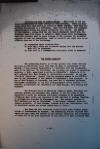
|
12.
11 July 1928.
"Summary of Activities from June 1 to
July 10 and Present Conditions in
Nicaragua," Admiral D. F. Sellers,
Managua, to USMC Major Gen. Commandant
J. Lejeune, p. 12.
" . . .
Location and Size
of Outlaw Groups: - That there is
now any large concentration of armed
outlaws is very doubtful. There are many
indications that they desire to return
to NUEVA SEGOVIA. That they are avoiding
the Marines is a certainty; they have
NOT shown the slightest aggressiveness
during the period covered by this
report. One theory is that Sandino,
seeing that his men would eventually
desert him, has disbanded them with
orders to return to their homes after
haranguing them with promises that he
would arrange in the meantime for
plentiful supplies of arms and
ammunition; such is possible and might
have as an ultimate plan one of the
following; ¶ To reorganize about
election time. ¶ To wait until after the
elections hoping that the Marines then
will be withdrawn. ¶ To take part in a
contemplated revolution later in
Honduras. ¶
THE
COMING ELECTION ¶
The Commanding General is of the opinion
that armed outlawry has been so
effectively dealt with the NO fear is
entertained of the ability of this
element successfully to interfere with
the accomplishment of our mission, ‘To
facilitate, and in every way assist in
rendering possible, a fair, supervised
election in NICARAGUA’. Naturally it is
with outlawry that this Brigade is
particularly concerned. As for the
‘Political Situation’, there lies the
greatest menace to the fulfillment by
our government of its promise to
supervise a fair election. So far as
this Brigade is concerned, the best way
to counteract political influences
prejudicial to the full accomplishment
of our mission is to maintain in
NICARAGUA our reputation for
impartiality, fair dealing and firmness.
¶ The National Board of Elections
(General McCoy, Chairman) has recently
decided and announced that neither of
the two wings of the Conservative party
has produced sufficient evidence to be
considered officially that party, and
therefore is NOT entitled to various
functional prerogatives accorded by
Nicaraguan law. The eventual outcome of
this decision cannot be determined. A
one-ticket (Liberal) election appears
probable; if this happens, another civil
war, ‘revolution’, will be inevitable
unless our troops remain here in force.
¶ The free and fair elections could be
held today without possibility of
interference by Bandits. The Commanding
General believes that there are many
other bad factors in the present
situation, the correction of which are
of far more importance to the conduct of
fair elections than . . . "
|
|
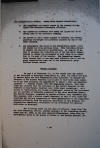
|
13.
11 July 1928.
"Summary of Activities from June 1 to
July 10 and Present Conditions in
Nicaragua," Admiral D. F. Sellers,
Managua, to USMC Major Gen. Commandant
J. Lejeune, p. 13.
" . . . the
elimination of Sandino. Among these
adverse factors are: ¶ a. The inquietude
and unrest caused by the conduct of many
unjust and dishonest Nicaraguan
officials. ¶ b. The increasing evidences
that money and liquor are to be freely
used in the political campaign. ¶ c. The
growth of small bands engaged in
thievery and robbery, generally
encouraged for political purposes by one
or the other factions. ¶ d. And
principally the split in the
Conservative party, still not healed and
daily growing worse. This situation
directly hinders the mission of
pacification. As long as it exists it
prevents the effective use of the two
party organizations to spread the
propaganda of good order as an essential
to the good of the country. The
Commanding General feels assured that he
can make such effective use of the two
party organizations when and if the
Conservative party factions become
united. ¶
GUARDIA
NACIONAL ¶
On Page 9 of Reference (c), it was
stated that ‘By decree of the President
of Nicaragua dated March 21, 1928, the
office now held by General McCoy was
from thenceforth given authority ‘to
command the services of the Guardia
Nacional and to give to that force such
orders as he may deem necessary and
appropriate to insure a free and
impartial election’.’ Without council
with the Commanding General, this
authority has directed that the
personnel of the Guardia Nacional be
distributed at Departmental Capitals
only (with minor exceptions). As a
result of ‘Instructions for forces in
Nicaragua’ issued by the Department and
the exercise of authority conferred in
the above mentioned decree, the Guardia
Nacional, commanded by marine officers,
very dependent upon this command, with a
mission almost identical to that of this
force and receiving the fullest
cooperation of these Headquarters is now
completely divorced officially from the
military operations of this Brigade, the
organization immediately responsible to
our Government for military activities
in Nicaragua. ¶ The following facts (in
the case of Officers, taken from letter
from Commanding Officer, Guardia
Nacional to the Commanding General,
dated June 30, 1928); in the case
enlisted Nicaraguans; taken from the
distribution shown in the Record of
Events of the Guardia Nacional for . . .
"
|
|
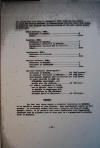
|
14.
11 July 1928.
"Summary of Activities from June 1 to
July 10 and Present Conditions in
Nicaragua," Admiral D. F. Sellers,
Managua, to USMC Major Gen. Commandant
J. Lejeune, p. 14.
" . . . the
period July 1 to July 7, inclusive,
1928) indicate the extent to which the
Guardia Nacional is disassociated from
the field duty being performed by this
Brigade and the garrisoning of the more
remote places in Nicaragua. ¶ Field
Officers, USMC: ¶ Stationed in MANAGUA 5
¶ Others None ¶ Captains, USMC: ¶
Stationed in MANAGUA 7 ¶ On railroad
(exclusive of MANAGUA) 1¶ Departmental
Capitals NOT on railroad 4¶ Others None
¶ Lieutenants, USMC: ¶ Stationed on
railroad 9 ¶ Others None ¶ Warrant
Officers, USMC: ¶ Stationed in MANAGUA 1
¶ Stationed in BLUEFIELDS 1¶ Others None
¶ Enlisted Personnel (Nicaraguans): ¶
Stationed in MANAGUA 781 (60% Approx.) ¶
On railroad (exclusive of MANAGUA 270
(20% plus.) ¶ Departmental Capitals NOT
on railroad 141 (11% approx.) ¶ In quiet
stations in LEON and CHINANDEGA
Departments, and mostly near the
railroad 69 (5% plus.) ¶ All others,
stationed at JICARO and at QUILALI, soon
to return to MANAGUA in compliance with
instructions by the Chairman, National
Board of Elections 44 (4% minus).
¶
HONDURAS ¶
The fact that there exists a potential
revolution in HONDURAS is an immediate
concern of this Brigade. Some
apprehension exists in that country. As
previously stated (See under ‘Location
and Size of Outlaw Groups’, above), it
is possible that armed Sandinistas have
temporarily disbanded with an ultimate
plan to take part in a contemplated
revolution later in Honduras. . . . "
|
|
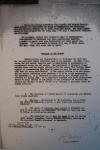
|
15.
11 July 1928.
"Summary of Activities from June 1 to
July 10 and Present Conditions in
Nicaragua," Admiral D. F. Sellers,
Managua, to USMC Major Gen. Commandant
J. Lejeune, p. 15.
" . . . ¶
During the period covered by this report, the
Brigade Intelligence Officer has made
three (3) trips to TEGUCIGALPA for
conference with the Military Attaché
(U.S. Army) stationed there. The
intelligence report of this Brigade for
the week, July 1 to July 7 (inclusive)
contains the following: ¶ ‘It is fairly
certain that Sandino’s lines of
communication from HONDURAS to NICARAGUA
have been considerably impaired. A
number of agents have been intercepted
and their papers confiscated. It is
reasonable to assume that some of these
agents who carry money will never show
up again.’ ¶ SUPPLIES
IN THE FUTURE ¶
Communications and transportation in
Nicaragua are such that for the most
part supply activities have to be
seasonal. In other words, during the dry
season, supplies must be distributed in
anticipation of requirements during the
wet season. The employment of Transport
Planes can NOT alone meet the supply
situation for the reason that landing
fields capable of accommodating this
type of plane are very few and do NOT
coincide with our troop distribution. If
the supply problem to be met during the
dry season commencing about December 1
is to be solved economically and
successfully, it is important to know
exactly what strength must be provided
for during 1929. It is therefore
apparent that these Headquarters should
be early advised of the policy of our
government as concerns the mission and
strength of Naval Forces to be retained
in Nicaragua after the coming elections.
¶ 3. The following is a brief summary of
conclusions and reiterations deemed
important: ¶ a. Mission: - Our mission
is ‘To facilitate, and in every way
assist in rendering possible, a fair
supervised election in NICARAGUA’. ¶ b.
The morale of existing armed outlaws in
NICARAGUA has been so worn down by our
activities that they are resorting only
to hiding and avoiding the Marines. ¶ c.
The authorized use of Tear Gas Bombs by
our Air Service would produce tremendous
results towards absolutely clearing up
the so-called ‘Bandit Situation’ in
NICARAGUA." [STAMP ON DOCUMENT:
DECLASSIFIED DOD Dir. 5200.9 Sept 27,
1958]
|
|
forthcoming
|
15 July 1928.
Patrol Report extract, W. C. Hall, La
Luz Mine (in IR28.07.16: 6).
|
|

|
20 July 1928
(1230).
Radiogram from Capt. Matteson, El Gallo,
to Major H. H. Utley, Puerto Cabezas.
"ADAN GOMEZ WAS A
COLONEL OF LIBERAL FORCES DURING LAST
REVOLUTION PERIOD REPORTED TO HAE ACTED
AS SPY AND COURIER BETWEEN SANDINO AND
RIO GRANDE VALLEY SINCE REVOLUTION AND
TO HAVE APPEARED IN LA CRUZ ABOUT TWENTY
FEBRUARY NINETEEN TWENTY EIGHT WITH SUB
THOMPSON GUN IN HIS SACK COMMA TO HAVE
PARTICIPATED IN FREQUENT DISTURBANCES
AND STRIKES IN THIS VALLEY COMMA TO BE A
FUGITIVE FROM JUSTICE COMMA TO HAVE
ESCAPED FROM CONFINEMENT DURING TENANCY
OF GOVERNMENT FORCES IN EL GALLO PERIOD
GOMEZ GIVES PLACE OF RESIDENCE AS SEIR
WAS CREEK COMMA RIO GRANDE VALLEY AND
HOLDS TWO RECEIPTS FOR WEAPONS TURNED
OVER TO UNITED STATES FORCES AFTER
REVOLUTION PERIOD WAS APPREHENDED DURING
BRAWL IN LA CRUZ COMMA TEN JULY NINETEEN
TWENTY EIGHT WHEN HE REPROACHED THE
COMMANDANTE STOP MATTESON 1230."
|
|

|
20 July 1928
(1430).
Radiogram from Comsperon to Major H. H.
Utley, Puerto Cabezas.
|
|
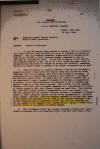
|
1.
21 July 1928.
"Affairs in Nicaragua,"
Admiral D. F.
Sellers, Balboa, Canal Zone, to Chief of
Naval Operations, Washington D.C., p. 1.
"1. On June 8th
General McCoy arrived at Balboa in the
S.S. CALIFORNIA with orders from the
State Department to return to Nicaragua
as quickly as possible. The only
available commercial transportation to
Corinto at the time was the ACAJULTA, a
small coasting steamer, scheduled to
sail on June 12th via intermediate
ports. As the time of sailing of the
ACAJULTA was postponed from day to day,
and as the U.S.S. Denver was under
orders to proceed on June 14th direct to
Corinto to relieve the GALVESTON,
permission was given to General McCoy to
proceed in the DENVER, accompanied by
his wife. ¶ 2. While in Balboa, the
Squadron Commander received the
Department’s dispatch in which it was
stated that General McCoy had informed
the State Department that, in his
opinion, more troops were needed in
Nicaragua. In accordance with the
instructions contained in this dispatch,
a conference was held with General
McCoy. He agreed with the Squadron
Commander that it was inadvisable to
send a regiment of cavalry to Nicaragua
as suggested by an official of the State
Department, but otherwise he had no
concrete suggestion to make as to the
number required. When informed that the
Squadron Commander had called upon the
Brigade Commander for a recommendation
by radio, he readily agreed to wait
until General Feland was heard from. The
following day, when shown General
Feland’s recommendation, he at once
agreed to it, but when informed that the
Squadron Commander intended to recommend
a different number, he then immediately
agreed with the latter recommendation.
The forgoing incident, therefore, leads
the Squadron Commander to believe that,
owing to his absence from Nicaragua and
his lack of that intimate knowledge of
the military situation that is possessed
by those upon whom the responsibility
for the conduct of the campaign rests,
General McCoy’s opinion is based solely
upon the failure of the marines to
capture Sandino. ¶ 3. When in Managua in
May, the Squadron Commander arranged
with General Feland to accompany him on
an inspection trip to the east coast
where, after . . . "
|
|
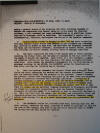
|
2.
21 July 1928.
"Affairs in Nicaragua," Admiral D. F.
Sellers, Balboa, Canal Zone, to Chief of
Naval Operations, Washington D.C., p. 2.
" . . . making a
general survey of the situation and
after returning together to Managua and
conferring with General McCoy as to his
needs for electoral personnel, a well
reasoned and sound recommendation as to
additional forces required in Nicaragua
could be submitted. The Department’s
request for a recommendation, therefore,
anticipated the action of the Squadron
Commander. ¶ 4. General McCoy arrived in
Managua on June 17th and after
conferring with him, General Feland
sailed from Corinto in the GALVESTON the
following day, arriving at Balboa on
June 21st. On June 25th the ROCHESTER
transited the Canal and the Squadron
Commander, accompanied by General
Feland, sailed from Cristobal for Puerto
Cabezas, arriving there at daylight June
27th. ¶ 5. The usual inspection was made
of the marine post at Puerto Cabezas,
including the flying field, and the plan
of campaign on the east coast was
thoroughly discussed and approved. Major
Utley is a very energetic, capable and
efficient officer and has done excellent
work under extremely difficult
conditions. After making the necessary
arrangements for the distribution of
personnel arriving in the BRIDGE, the
ROCHESTER sailed for Bluefields on June
29th, arriving the following day at
daylight. ¶ 4. Both the Squadron
Commander and General Feland went ashore
early at Bluefields and after inspecting
the marines and the Guardia detachment,
conferred with the American Consul and
the Governor of the province. General
Estrada, the governor, stated that
everything was quiet on the east coast
and expressed himself as perfectly
satisfied with existing conditions. A
delegation of citizens attempted to have
an interview with the Squadron
Commander, but on learning that it was
for the purpose of discussing a matter
of purely local politics, they were
politely informed, through the consul,
that lack of time would not permit. As
the political campaign progresses in
Nicaragua, politicians and others are
constantly endeavoring to draw the
Squadron Commander into a discussion of
politics which, it is needless to say,
he constantly declines to do. While the
visit with the consul, Mr. Fletcher, was
necessarily brief, the impression gained
was distinctly favorable and the
Squadron Commander cannot refrain from
stating that he is a great improvement
over his predecessor, Mr. McConnico. ¶
7. The ROCHESTER sailed for Cristobal
June 30th, arriving July 1st, and after
coaling, transited the Canal, arriving
at Balboa on July 2nd. On July 4th the
crew of the flagship took part in the
patriotic exercises held at Balboa and
on July 5th the ship sailed for Corinto.
. . . "
|
|
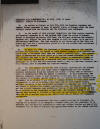
|
3.
21 July 1928.
"Affairs in Nicaragua," Admiral D. F.
Sellers, Balboa, Canal Zone, to Chief of
Naval Operations, Washington D.C., p. 3.
" . . . ¶ 8. On
arrival at Corinto on July 8th, both the
Squadron commander and General Feland
proceeded at once, by special train, to
Managua where the usual official visits
with the minister and the President were
exchanged. ¶ 9. As the result of this
personal inspection, and from reports
received, the Squadron Commander is of
the opinion that since the return of
General Feland to Nicaragua on January
15th last, the military situation has
steadily improved and, despite the fact
that Sandino is still at large, it is
now in a satisfactory condition. The
last casualty to our forces was on May
18th, two months ago, and for a
considerable period of time that the
outlaws have avoided contact with the
marines. ¶ 10. On April 11, 1928, the
President of Nicaragua wrote to the
American Minister and authorized our
forces to offer general amnesty to all
outlaws who are willing to surrender
their arms and ‘adopt a peaceful life.’
This general offer of amnesty was not
made public as it was not deemed
desirable to do so. The procedure has
been to get in touch with leaders of
subordinate groups of outlaws whenever
information is received that such
leaders may be induced to surrender. Up
to date 538 self-confessed bandits, many
of whom have recently been with Sandino,
have surrendered and received amnesty. ¶
11. The intelligence service has been
steadily improving and the brigade
intelligence officer has made three
trips to Tagucigalpa and has obtained
valuable information which has enabled
our forces to break some of Sandino’s
lines of communication with his agents
in Honduras. In this connection, the
Squadron Commander wishes to draw
attention to the fact that the campaign
of the marines in Nicaragua against
Sandino and the outlaws has been
characterized throughout by the absence
of any cruel or inhuman methods to
obtain much needed information. So far
as is known, there have been no third
degree methods employed and while it has
undoubtedly prolonged the campaign and
often deprived our forces of valuable
and timely information, both the
Squadron Commander and the Brigade
Commander have prohibited the use of any
such methods. It may be of interest to
the Department to know that the Squadron
Commander has frequently been advised by
officers of the Army who saw service in
the Philippines that the use of methods
such as the ‘water cure’ and so forth,
are frequently efficacious. ¶ 12. With
the reinforcements that have recently
arrived in Nicaragua, including the
personnel to be assigned to General
McCoy for the elections, it is believed
that the Military situation is such that
neither Sandino nor any of his followers
will be able to exercise any appreciable
effect on the coming election. . . . "
|
|
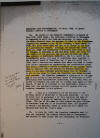
|
4.
21 July 1928.
"Affairs in Nicaragua," Admiral D. F.
Sellers, Balboa, Canal Zone, to Chief of
Naval Operations, Washington D.C., p. 4.
" . . . ¶ 13. He
stated in the Squadron Commander’s
dispatch of July 19th (0019 1405), the
political situation in Nicaragua is
regarded at still far from satisfactory.
To begin with, the McCoy Election Law,
the passage of which by the Nicaraguan
congress was assumed to be, by Mr.
Stimson, a mere matter of form, was
twice voted down and had to be issued in
the form of a presidential decree.
Although the decree was issued on March
21, 1928, and nominating conventions
were held in Leon and Managua on
February 19 and May 20th, 1928, the
rules for the conflict of the election
had not yet, on July 18, 1928, been
printed or published. Meanwhile, due to
a split in the Conservative party, two
sets of candidates were reported to the
National Board of Elections and it was
not until July 7, 1928, that a decision
was handed down which declined to
recognize either candidate as
representing the Conservative party.
This delay, covering a period of upwards
of six months, would seem to indicate
that the efforts of General Chamorro,
who early in the year informed General
McCoy that he intended to do all in his
power to block the election, are being
crowned with success. The Squadron
Commander’s opinion as to the wisdom of
the ruling of the National Board of
Elections in disqualifying both
Conservative candidates, has already
been reported by dispatch and need not
be touched upon again in this report. It
may be of interest to the Department,
however, to know that the American
Minister heartily agrees with the
Squadron Commander in his opinion. ¶ 14.
A copy of a translation of the decision
of the National Board of Elections is
enclosed herewith. It will be noted that
in paragraph 1 of this decision the name
of the President is given as heading one
of the Junta Directives. The use of his
name in this connection gave offense to
President Diaz and it is understood
that, for purposes of record, the
National Board of Elections will amend
its decision and omit Mr. Diaz’s name. ¶
16. On July 16, 1928, the Squadron
Commander went to Leon and inspected the
reserve battalions of bluejackets and
marines at that place. The man
comprising the bluejacket . . . "
|
|
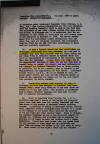
|
5.
21 July 1928.
"Affairs in Nicaragua," Admiral D. F.
Sellers, Balboa, Canal Zone, to Chief of
Naval Operations, Washington D.C., p. 5.
" . . . Battalion
under Lieutenant Commander Tully
Sjelley, U.S. Navy, are a fine looking
organization and the only criticism that
the Squadron Commander finds to make is
the fact that the enlistment of one
petty officer expired five days after
his arrival in Nicaragua and it is
understood that the enlistments of from
thirty to forty more men will expire
prior to the elections on November 4,
1928. The marine detachments from the
battleships looked particularly well and
while they were all uniformly excellent,
the detachments from the TEXAS and the
NEW YORK were outstanding in their neat
and soldierly appearance. ¶ 16. At Leon
a Spanish school had been established
and Nicaraguan instructors have been
obtained. Men assigned to electoral duty
have been relieved from all other duties
and are being given an intensive course
in Spanish which will later be
supplemented by instruction in the
electoral rules when they are published.
Colonel Hunt, U.S. Army, who is the
departmental chairman at Leon, and who
had been sent by General McCoy to
inspect the school, was most
enthusiastic and informed the Squadron
Commander that he found nothing to
criticize, but on the contrary, much to
commend in the administration and
organization of this school. Lieutenant
Colonel Willis, U.S.M.C., who is in
command at Leon, deserves great credit,
not only for the efficient manner in
which he has organized the school but
for the fine spirit that pervades the
entire command. ¶ 17. Twenty-nine
ensigns have reported for duty in
Nicaragua and have been assigned to
electoral duty under General McCoy,
seven being detailed to the east coast
and twenty two to the west coast. The
question of reimbursement of these
officers’ expenses had been made the
subject of separate correspondence. ¶
18. Prior to departure from Corinto, the
U.S.S. GALVESTON completed a survey of
the harbor and blueprint charts have
been made from the tracing furnished and
have been given to the masters of
merchant vessels visiting Corinto. In
addition to making an excellent survey,
Captain Craft submitted certain
recommendations relative to a change in
the buoyage of the harbor which involved
the purchase of two gas buoys and other
smaller buoys. While in Managua, the
Squadron Commander called on the
Collector General of Customs, Mr.
Lindberg, and persuaded him to authorize
the purchase of all buoys to carry out
Captain Craft’s recommendations. Orders
have been placed with the Panama Canal
for the purchase of these buoys and the
ROCHESTER will plant them and rebuoy the
harbor on the next visit to Corinto.
Great credit is due Captain Craft and
the officers . . . "
|
|
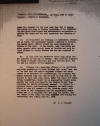
|
6.
21 July 1928.
"Affairs in Nicaragua," Admiral D. F.
Sellers, Balboa, Canal Zone, to Chief of
Naval Operations, Washington D.C., p. 6.
" . . . under his
command for the fine work they did in
making the survey and also to Captain
Baldridge of the ROCHESTER who has given
intelligent and enthusiastic cooperation
in getting the buoys and who will
supervise the planting of them. ¶ 19. To
facilitate the handling of passengers,
freight, and so forth, for government
vessels touching at Corinto, the senior
naval officer afloat has been designated
as Captain of the Port. As the result,
army transports and other vessels which
merely touch at Corinto are only delayed
fifteen to twenty minutes and are not
required to anchor. ¶ 20. On June 15th
the ROCHESTER fired long range target
practice in the Bay of Panama. This
practice completed all forms of target
practice, not only for the ship, but for
all vessels of the Squadron. ¶ 21.
Although the commanding officer of the
CLEVELAND requested permission to defer
holding full power runs, due to the fact
that the senior engineer officer was
under orders to be detached for
incompetency, the Squadron Commander
directed that the runs be held on June
27th as the failure to hold such runs
would, under the rules for engineering
completion, result in no engineering
trophy being awarded and would also
deprive the winning vessel from
obtaining the battle efficiency pennant.
As stated in a previous report, the
Squadron Commander has made every effort
to have all vessels of the Squadron
comply with all rules of both the
gunnery and the engineering competition
and it is believed that not only the
spirit, but the letter of the rules has
been complied with during the
competition year ending June 30, 1928. ¶
/s/ D. F. SELLERS"
|
|
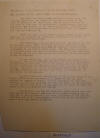
|
21 July 1928
(exact date unknown).
"Our Farewell to the Marine Corps of the
USS Rochester," translation of article
in La Voz del Atlántico,
Bluefields.
"For after two
long months stationed at this city, the
Cruiser, Rochester, has raised her
anchors, enroute to the City of Balboa
on the Canal Zone. During the permanence
of her crew in the city, we encountered
a satisfactory, just and equitable
impartiality to the entire Community,
this testifies for itself the good
executives to which this brave and
patriotic crew are entitled to. ¶ Order
was kept in the neutral zone, respect to
all civilians and to property was
maintained, therefore, the energy of its
officers are unexcelled. ¶ The
Rochester, as second line cruiser, was
placed in commission Aug. 1st, 1893, is
finely equipped with heavy guns, she is
now under Admiral J. D. Latimer
prominent figure in the admiralty of the
United States Navy. His struggle in
behalf of a stable peace will soon be
crowned, and will place his name in
history as one who with energy and
activity, seeks true principles of
humanity. ¶ We can safely say, that in
Bluefields the crew of the Rochester,
have left memorable thoughts for their
distinguished comportment in this City,
and we can safely say that they have won
the confidence and affection of all the
residents of Bluefields. Therefore, it
is due to Commander Hans Ertz, and his
obedient officers, and sailors, that
order and tranquility in this city, was
maintained. ¶ We think that with the
arrival of the Marine Corps of the
U.S.S. DENVER under Commander S. M.
LaBounty who has just arrived in
Nicaraguan waters, we will encounter the
same protection, in life and property,
as with the Corps of the Rochester who
now leave a very deep but sad space in
the heart of those who found in them all
justice and equity. ¶ Consequently, La
Voz del Atlantico presents its more
cordial salute to Commander LaBounty of
the Denver wishing him in this city a
long permanence, and bids, Au Revoir to
the Admiral, Officers, and to all the
members of the Crew of the Rochester,
also a safe trip across to Balboa."
|
|
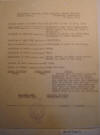
|
21 July 1928.
Weekly Record of Events from 15-21 July,
Mortimer S. Crawford,
Bluefields.
"Maps used –
Clifford S. Ham, 1924. Hydrographic
office chart, San Juan del Norte to
Bluefields. ¶ Location of outposts – El
Gallo, El Bluff, Rio Grande Bar,
detachment of Puerto Cabezas. ¶ Location
of main body – Bluefields. ¶ Duty
performed – Maintaining of order in
district. ¶ Condition of roads – Muddy.
¶ Condition of rivers – High. ¶
Ammunition on hand – Rifle: 107,3000; MG
Only: 3,200; Pistol: 14,360; FA: None;
37 MM: None. ¶ Rations on hand: 35 days.
¶ Health of troops – Good. Two sick. ¶
ORDERS RECEIVED: None ¶ ORDERS ISSUED:
None. ¶ EVENTS ¶ Patrols sent to Pearl
Lagoon and Guadalupe to search for
escaped prisoners. Bandit camp of
fifteen men reported ten hours from
Bluefields with two machine guns and one
37 MM. Two patrols sent out but could
not find trail to camp. Additional men
sent on patrol to Punta Gorda and Monkey
point in search for prisoners. ¶
MESSAGES SENT – Forty nine (49) ¶
MESSAGES RECEIVED – Thirty five (35) ¶
Mortimer S. Crawford"
|
|
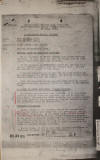
|
22 July 1928.
Intelligence Report, General, 15-21
July, 1st Lt. W. C. Hall, Puerto Cabezas
(p. 1 only).
“Reference: Daily
reports same period. ¶ Maps: Ham Map of
Nicaragua, 1924. ¶ (A)
GENERAL STATE OF
TERRITORY OCCUPIED. ¶ In the
vicinity of PUERTO CABEZAS the Liberal
meetings continue. To date there has
been no trouble and the meetings are not
being very well attended. ¶ In the
vicinity of BLUEFIELDS report was
received of a band of fifteen outlaws,
with two machine guns. Patrols are now
out in search of this band. ¶ A bandit
concentration of from two to three
hundred men was reported on the POTECA
RIVER. Our patrols should reach that
vicinity in about one week. ¶ With the
exception of the reports noted above no
events of importance have occurred
within the limits of the EASTERN AREA. ¶
(B) ATTITUDE OF
CIVIL POPULATION TOWARDS MARINES.
¶ No adverse reports have been received,
so it is assumed that the cordial
relations continue, and new friends are
being made. Reports from BOCAY indicate
that certain persons who would offer no
help previously, are now willing to give
out occasional items of information. ¶
C. ECONOMIC
CONDITIONS. ¶ On the rivers in
the northern sector the boatmen and
Indians are making more money now than
previously, due to our supply shipments.
In the BOCAY area, several persons have
declared their intentions to resume
mahogany cutting. In the mining
districts, people are returning to their
homes and work, in increasing numbers.
In the southern sector there seems to be
enough business to cause competition
between the several banana companies. ¶
On the whole, it can be said that
economic conditions in this area are
good, and steadily improving.”
|
|
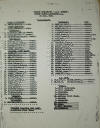
|
23 July 1928.
Marine Detachment Roster, USS
Denver, Puerto Cabezas (Library of
Congress, Edson Papers, box 18, folder
2).
|
|

|
25 July 1928
(1003).
Radiogram from Major H. H. Utley, Puerto
Cabezas, to Gen. Feland, Managua.
|
|

|
26 July 1928
(1433).
Radiogram from Major H. H. Utley, Puerto
Cabezas, to Gen. Feland, Managua.
|
|

|
26 July 1928
(no time indicated).
Radiogram from Major H. H. Utley, Puerto
Cabezas, to Gen. Feland, Managua.
|
|

|
27 July 1928
(no time indicated).
Radiogram from CO El Gallo to Major H.
H. Utley, Puerto Cabezas (p. 1 only).
|
|

|
27 July 1928
(1003).
Radiogram from Major H. H. Utley, Puerto
Cabezas, to Gen. Feland, Managua.
|
|
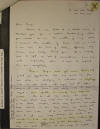
|
1.
30 July 1928.
Letter from Capt. M. A. Edson, 20 miles
above Bocay, to wife Mary, p. 1.
"Dear Mary: ¶
Seems to me that it is about time I
thanked you for a certain handkerchief
which you mailed to me the middle of
May, which I received the middle of June
and for which I am now, the last of
July, offering my sincere and hearty
‘Thank you’. It is mighty nice to get a
bit of remembrance from one’s sister,
especially when I seem to neglect her so
completely. ¶ Bugs – Bugs – and yet more
BUGS!!! What an opportunity this trip
would be for one who is studying or
interested in bugology. Three are all
kinds, all sizes, and all shapes –
around at all hours and alike only in
one respect – their ability to annoy and
keep me awake. Due to all the rains, the
river is so high that our boats have to
go along close to the bank, wending
their way between and under trees which
in the day seems are twenty feet above
the water. It is a common thing to have
to cut one’s way through the limbs. The
result is that all day one is busy
brushing off ants – worms – and bugs of
all disciplines. All day we look forward
to the camp at night, . . . "
|
|
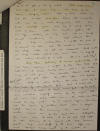
|
2.
30 July 1928.
Letter from Capt. M. A. Edson, 20 miles
above Bocay, to wife Mary, p. 2.
" . . . so as to
get a bit of relief. But night comes,
and with it more bugs . . this time of a
biting, stinging kind. All of them
bother one, but the small sand fly
defies all mosquito nets, and has a
quite disagreeable bite. We build smudge
fires and try to sleep alongside of
them, with the smoke getting into our
eyes, making us cry, and into our lungs
almost smothering us. But without the
fires, life is unbearable! With the
fires, it is almost as bad, and the
result is the same – no sleep until we
get so exhausted that smoke or bugs
bother not at all, and then we drop off
into broken slumber of a sort. It is a
great life! ¶ Day before yesterday it
rained continuously. It had been raining
a couple of days before that. But
Saturday it rained harder than ever. We
made camp at 4:00 p.m. My manaca leaned
but was some five feet above the waters
edge and looked fine. But at seven
thirty, the water came up to the edge of
the bamboo floor, and I moved out. This
time I went at least seven feet up the
bank and considered myself secure for
the night. But at 10:30 the sentry
called me – the water was already almost
at my feet. So I moved again, this time
into the cover of another shack where I
stayed until two in the morning, when
rain and water moved us for the last
time. Altogether the river rose at least
15 to 20 feet that night. In the morning
it was covered with trees, banana
plants, bugs, and drift of all kind.
After our boat capsized losing most of
its contents. I . . . "
|
|
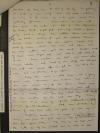
|
3.
30 July 1928.
Letter from Capt. M. A. Edson, 20 miles
above Bocay, to wife Mary, p. 3.
" . . . decided
to lay over the rest of the day. So
yesterday we made a new camp and sat
still . . watching the river as it came
up to its peak, about three yesterday
afternoon. Even then we were not free
from the water, for late in the
afternoon the bank, about eight feet
from my shack, gave way and a large tree
settled down over one of our boats,
sinking it and the rations therein.
Quick work saved all the rations except
one sack of beans, which had been wet
before, and one more wetting was just
too much. Another sack of beans were
dried out and will be all right, I
think. Some crackers were lost, and some
other minor articles, but most of the
stuff was salvaged. The boat was raised
after we got the tree out of the way,
and is already to go again. ¶ Today the
river is still high – but is going down
and tomorrow, rain or shine, high water
or low, we move on up the line. Right
now we are in the wilderness – for we
have not seen a house in four days and
are not due to see another for the next
two days. Then we come to a series of
Spanish settlements – all friends of old
Sandino. But even at that, a house of
any kind will be good for sore eyes. ¶
Airplanes came over a couple of hours
ago, bringing news from the post and a
box of chocolates for yours truly. The
trees are too high, and the hills go up
too straight from the river to let . . .
"
|
|
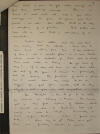
|
4. 30 July 1928.
Letter from Capt. M. A. Edson, 20 miles
above Bocay, to wife Mary, p. 4.
" . . . them land
or even to get close enough to give them
pick-up messages. There is no chance to
send mail out, only a few coded messages
can be given the planes from the ground
– so when this letter starts on its way
is something of a question. But letters
can come into us and that is something
of a consolation. ¶ Mother’s last letter
said she and Dad were moving back to
Chester. Since then I have heard nothing
from her. I am wondering if there is not
a small place in or near Chester which
would be suitable for them and on which
they would make a living. Do you know of
any? If I stay out here in the bush
until the end of the year, I should be
financially able to swing the purchase
of such a place and I would like very
much to do so. Suppose you put your
humble wits on this subject and pass on
all suggestions. ¶ The Rochester is due
to go to the States for overhual in
February or March. Her home port is New
York instead of Boston, which is almost
as close to Burlington but not nearly so
close to Chester. Personally I would
prefer Boston. When I finish sea duty, I
shall try to get Phila as a first choice
and probably Boston as second . . . "
|
|
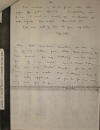
|
5. 30 July 1928.
Letter from Capt. M. A. Edson, 20 miles
above Bocay, to wife Mary, p. 5.
" . . . The
enclosed is to be placed with other
papers for future reference.
Incidentally seems to me I must be owing
you considerable for safe-deposit box
rental. How about it? ¶ Lots and lots of
love to you, my Sister. ¶ Merritt. ¶
P.S. Just remembered something was said
in one of my letters from Ethel that
among the books received for my birthday
was one from you. If I am right, and I
know I am – here are my belated thanks.
You are so much wiser a sister than I
deserve – and I do really appreciate all
you do for me, and my love goes to you.
¶ Merritt."
|
|
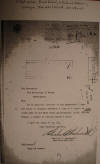
|
1. 31 July 1928.
Report on conditions on East Coast by
Walter Wilgus of Gen. McCoy's staff;
cover letter from C. Eberhardt, US
Minister Managua, to Sec. State,
Washington D.C., July 31, p. 1.
"... Sir: ¶
As of possible interest to the
Department I have the honor to transmit
herewith a copy of a report on
conditions on the East Coast of
Nicaragua, by Mr. Walter Wilgus, a
member of General McCoy’s staff. ¶
I have the honor to be, Sir, ¶
Your obedient servant, ¶
Charles C. Eberhardt, ¶
American Minister."
|
|
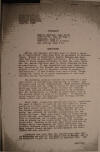
|
2. 31 July 1928.
Report on conditions on East Coast by
Walter Wilgus of Gen. McCoy's staff, p.
2.
"... ITINERARY
¶ Puerto Cabezas, June 20-23
¶ Bluefields, June 24-July 5
¶ Greytown, July 6-7 ¶
Castillo, July 8, 2 hours ¶
San Carlos, July 9-10. ¶
ELECTIONS ¶ Marine and
Guardia officers seem to think a
check-up of registrants’ dwellings will
be necessary to minimize fraud. Except
in Bluefields, Puerto Cabezas and
Greytown this will be extremely
difficult. If it is undertaken it
would appear advisable to send the local
chairmen (ie. marine enlisted men) to
their stations as soon as practicable.
It was suggested that each local
chairman, assisted by the Liberal and
Conservative members, prepare a rough
list of eligible voters in advance of
registration. It was thought that
such a list, though incomplete, would be
of great assistance to the local
chairman during registration. ¶
The Moravian mission records can be used
to a certain extent in determining
eligibility of voters. The
Moravians have 11,000 communicants.
Each mission station, of which there are
12, keeps a record of each convert’s
birth and later history. These
records are complete from 1888, and are
generally admitted to be accurate.
Rev. Mr. Heidenreich, in charge at
Bluefields, told me the society would be
glad to co-operate. It should be
noted however that the Moravians are
strongly liberal (under cover) and
anti-Catholic. ¶ Major Sage,
commanding Bluefields Guardia,
emphasized the need of plenty of boats
as the sole means of transportation at
this season. The marines are now
using a few small native boats with
Johnson outboard motors. The
Cuyamel company speed boat (“Red Devil”)
20 to 25 knots, can probably be borrowed
occasionally for the Bluefields area.
Sage also urged haste in distributing
public notices, proclamations, etc.
regarding registration or elections, as
it takes several days to post them at
points up the rivers after they are
received at Bluefields. Similar
kicks were made about slow and uncertain
mails from Managua and fears expressed
that election business would cause
congestion on the radio. Sage
thought direct airmail between Managua
and Bluefields the only solution.
¶ Liberals are glad that two
registration days fall on Wednesday as
most of the ships load on Sunday, and it
is difficult to get the laborers to
register then. One ¶
American ... "
|
|
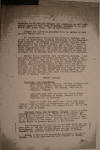
|
3. 31 July 1928.
Report on conditions on East Coast by
Walter Wilgus of Gen. McCoy's staff, p.
3.
"... American at
Bluefields thought all companies on the
coast should agree to shut down on
Sunday, November 4, to permit a full
labor vote. (He is pro-liberal).
¶ Liquor for election purposes
will be cached by both parties before
Nov. 4. ¶ No conservative
activity was noted at Cabezas, and
little at Bluefields, pending settlement
of the Chamorro Diss dispute. At
Cabezas several hundred laborers from
the interior and the West Indies were
laid off recently. Estimates of the
number run from 500 to 1500 or more.
I heard suggestions that the
conservatives might subsidize these
during election, but think it doubtful
as many are drifting out of Cabezas down
to Bluefields and elsewhere. ¶
Except for a courtesy call on General
Estrada, I did not call on leaders of
either faction. Dr. Arana,
conservative leader, was out of town
during my stay at Bluefields. Dr.
Onofre Sandoval, liberal leader at
Bluefields, made two appointments to see
me but failed to show up. I met
Fletes, Alfred Hooker and other
liberals, but most of the liberal
propaganda that came my way was through
Joe Riordi (see below) and Irineo
Estrada, eldest son of Gen. Estrada, who
made the trip from Bluefields to Managua
with me. ¶ PUERTO CABEZAS
¶ Newspaper
Correspondents: ¶
Associated Press. Downing, customs
collector,O/K ¶ N.Y. Times,
Ahern, employed by Standard Co. ¶
Chicago Daily News, Bob Murphy, employed
by Standard Company. ¶
International News Service and United
Press, Wright, secretary to McKay,
manager for the Standard Co. in Cabezas.
¶ None of these are staff men.
They send practically nothing except in
emergencies like the Marshall Capture.
All are believed O.K. except Wright, who
is now kept in hand by McKay. ¶
Standard Fruit
and Steamship Company (which
includes Bragmans Bluff Lumber Co.)
Stock in this company, per value $100,
was at 44 in New Orleans in mid-June.
Since the Vaccarros stepped out of
control the concern is said to be
operated by the banks, with one Moss as
head. Commander Walsh is general manager
in New Orleans. ¶ The
Nicaraguan division is in critical shape
and the next year or two may decide
whether it will be continued or
scrapped. Veach, an Englishman who
was manager at Cabezas, was recently
recalled and allowed to resign. ¶
McKay, a decent and apparently able
sort, is now in charge. He is an
engineer and was formerly in Panama.
¶ Age ... "
|
|
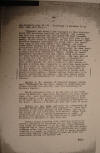
|
4. 31 July 1928.
Report on conditions on East Coast by
Walter Wilgus of Gen. McCoy's staff, p.
4.
"... Age slightly
over 40 (?). Following in synopsis
of an hour talk with him:--- ¶
"Standard has about 5,000 employees in
this division – about 300 including
families are whites – Our trouble has
been bid overhead and low output – We
must increase output while reducing
overhead – I hope next year to have
nearly 15,000 acres in bananas – We now
have around 9,000 – Previous managers
developed the wrong land – Our operation
loss is now very heavy – For example,
our hotel loses $1500 monthly on a cost
basis – We have reduced locomotives from
12 to 6 and do practically the same work
– We out and ship excellent grade of
pine and have a large contract now with
Venezuela – (Note. Murphy of
lumber department estimated they had
timber stand sufficient for only sixteen
months more cutting). – We have
$45,000 in claims for last revolution
(August to December). – Don’t
expect to collect it. – State
department should have backed Sacasa or
Moncada a strong man. – Legality
of elections seems doubtful as a state
of war exists in north and the deputies
did not adopt the election law. –
Very unfavorable to railway project as
commercial proposition though sees
benefits politically. – Thinks
railway would have to be heavily
subsidized for years. – Has been
asking state department unsuccessfully
for consular agent at Puerto Cabezas."
¶ Martin,
J. F., manager of Standard
Company commissary, ex-manager La Luz
mine. (Baker at Bluefields and
others discount his ability, call him
pensionado of Fletcher family). ¶
Martin estimates loss to La Luz mine in
the three raids as $250,000 – said mine
was unhurt but mill, buildings, etc.,
were destroyed – estimates $10,000 in
gold amalgam taken – says ownership of
Bonanza-Neptune mine is in doubt as H.
F. Springer of Bluefields embargoed it
for debt. (Clancy of Bluefields also has
claim on mine). ¶
Castro, Lt. Col.
Luis, age about 40, commandant at
Cabezas, draws salary also from Standard
Co., home Leon, educated at military
academy in New Jersey, told me he had
helped fit out revolution from Mexico.
Major Utley considers him one of ablest
Nicaraguans on coast. At present
very American in his actions as it pays
him. Following is synopsis of talk with
him: ¶ Favors finger
printing with indelible solution to
prevent repeating at elections (he got
this suggestion from Utley but advanced
it as his own) – says Liberals comprise
75% of total population – thinks Marines
should withdraw after election – thinks
Conservatives will claim election is
illegal as country is not at peace –
severely criticizes Sandino – says
Sacasa is weak and unfit for presidency
– strong for Moncada now. ¶
Note: ..."
|
|
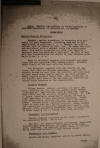
|
5. 31 July 1928.
Report on conditions on East Coast by
Walter Wilgus of Gen. McCoy's staff, p.
5.
"...
Note:
Sandino has brother or cousin employed
in drafting department of Standard Co.
at Cabezas. ¶ BLUEFIELDS
¶
Marine-Guardia Situation: ¶
Kendall, marine commander, is unpopular
with Liberals and many Americans,
including some who do not dabble much in
politics. Kendall has done
excellent work in taking up guns, etc.
He seems very able and ambitious, with a
natural taste for intelligence work.
His mental processes are more like those
of a Spaniard than any American I ever
met. He fits in well with the
Conservatives and should be very
valuable under Major Price. ¶
Sage is extremely popular with Liberals
and Americans and not unpopular with
Conservatives. Everyone spoke
highly of his work with Guardia. ¶
The Liberals, together with Joe Riordi,
Dr. Marchand, and other pro-Liberal
Americans, urge that no Guardia troops
be sent from the interior, and cite many
alleged cases where Creole Guardia men
have arrested other Creoles without
favoritism. Capt. Cronmiller of
the Guardia said some of the men from
the interior had caused minor troubles
in the organization. ¶
Alcalde Dispute
¶ Eliseo Duarte, liberal candidate
for mayor last year, probably won the
election against Pablo Torres,
conservative. Registration books
at Rama Key, however, were "lost" and
the election declared invalid. Dr.
José D. Arana, Bluefields conservative
leader, is said by local Americans to
have engineered the fraud. Torres
held office until recently and then took
a few weeks leave. Charles Dixon
(conservative) succeeded and refused to
step down when Torres returned.
Dixon cleaned the streets and is
generally popular as a result.
Gen. Estrada, after consulting President
Diaz, is understood to favor keeping him
in office until next election. ¶
Newspaper
Correspondents ¶
Darner, customs collector at the Bluff,
represents the Associated Press.
He is O.K. ¶ Sam Weil, old
timer strongly pro-liberal, represents
International News Service and possibly
United Press also. Fletcher, the
American consul, seems like him.
He is quiet and unlikely to make trouble
openly. ¶
Newspapers (all
weekly) ¶ Bluefields
Weekly (English) edited by Alfred
Hooker, ¶ Creole ... ”
|
|
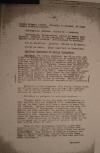
|
6. 31 July 1928.
Report on conditions on East Coast by
Walter Wilgus of Gen. McCoy's staff, p.
6.
"... Creole
Liberal leader. Friendly at
present, at least toward election
project. ¶ Informacion,
Liberal, edited by – Roblete. ¶
Informacion, Conservative, edited by
Marmel Pais Fonseca. Fonseca is
now postmaster. Reputation bad.
Opposes Dixon as alcalde. Not
friendly to election. ¶ Voz
de Atlantico. Liberal.
Edited by H/ Salter. ¶
Correa de Carib. Least important
in Bluefields. ¶
American
Opponents of Marine Occupation
¶ Marchand, Dr. Louis, American,
age 55 or more, has lived in
Pennsylvania and claims to be graduate
of University of Pennsylvania medical
school, also to have contributed
scientific papers to American medical
magazines. Says he knows Dr. V.O.
Vaughan, former dean University of
Michigan medical school who is now
retired and living in Washington.
Claims to be friend of Henry and "Gil"
Fletcher, intimate with "Gil".
Says he worked for latter as medico at
La Luz, -- "went there for his health
after breakdown in States."
According to Dr. Humphreys, a level
headed American in Bluefields, Marchand
was near DT’s but now drinks little or
nothing. Marchand has little
practice but excellent reputation as a
laboratory man. ¶ Marchand
is well educated, with strong liberal
views, and at home would probably be a
militant anti-imperialist. He is
bitter against marines and navy, and
especially so against Kendall. ¶
Following is synopsis of talk with
Marchand: -- ¶ "General
McCoy is the only hope for Nicaragua – a
fair election will put Liberals in by
tremendous majority and the East Coast
will have a chance to spend its own
revenues. Admiral Latimer and the
marines have lost the confidence of
Nicaraguans in American integrity –
Sandino has also destroyed the marines’
prestige. Dr. Sacasa is a high
grade man – Kellogg blundered in not
recognizing him. Marines should be
withdrawn after elections but American
officers of the Guardia should be
retained. Slow recruiting of
Guardia on East Coast not due to low
wages but to past record of marines,
which has made natives afraid to join.
¶ "Crux of whole Nicaraguan
situation is New York bankers' control
of revenues and their influence with
State Department, leading to subsequent
naval and marine interference.
Only solution is complete financial
control by impartial American official
who is not under thumb of banks.
Gen. McCoy ought to take that position
after elections." ¶ Marchand
..."
|
|
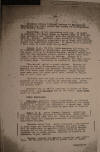
|
7. 31 July 1928.
Report on conditions on East Coast by
Walter Wilgus
of Gen. McCoy's staff, p.
7.
"... Marchand
writes frequent letters to Springfield
Republican and other papers and boasts
of corresponding with Senator Borah.
¶ Major Sage is not acquainted
with him. It might be advisable
for Major Price or Captain Best to show
him some attention and “confer” with him
occasionally, also with Mr. Clancy.
Marchand could probably be conciliated
if tactfully handled, especially as he
seems very friendly toward the
supervised election. If there is
no objection I will keep in touch with
him by mail. ¶
Clancy, M.J.,
70 (?), Irish-American old-timer, ex US
consular agent at Bluefields, now
Norwegian consul, has money tied up in
Bonanza-Neptune, miserly toward himself
but has assisted others, doesn’t drink,
mind still clear but has difficulty in
talking. Clancy is a chronic
kicker and unfriendly to Kendall but
very friendly toward Sage.
Following is outline of talk with him:
¶ "Non-secret ballot a great
mistake. Customs officials as bad
as Nicaraguans except they don’t steal.
Marines and Kendall are anathema,
Guardia doing fine. New York banks
have milked Nicaragua. Conant
should have made peso (50 cents gold)
unit instead of dollar. Why in
hell didn’t he? ¶ "Liberals
are too lazy to push their claims and
would probably be as bad in office as
conservatives. Intervention as
mistake. U.S. ought to let
Nicaraguans kill one another off."
¶ Kirkwood was in US but expected
to return to Bluefields soon.
H. F. Springer
was up the river.
Leon Frank
quiet at present. ¶
Other Americans:
¶ Fletcher,
American consul (from Maine, no relation
to Ambassador Fletcher), transferred
recently from Havre, formerly in
Colombia and Venezuela. A career
man. Methodical office work,
criticized by Americans at Tropical club
for not "mixing". ¶
Baker, S.H.,
agent Cuyamel Company. Ablest and
most level headed American in
Bluefields. Blunt with natives and
gets away with it. Lets no grass
grow under his feet where his company’s
interests are concerned.
Interviews follows: ¶
"Guardia is doing fine. After
elections a few marines on each coast
and reserve at Panama, for moral effect,
will be sufficient to maintain order
(assuming Sandino is then out of the
picture). Guardia could be partly
financed out of extra revenue obtained
by breaking up moonshine liquor traffic.
¶ "Cuyamel company has $50,000
claims for last revolution. We
whittled this down to actual cost of
barges ¶ supplied to ... "
|
|
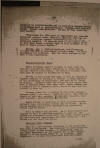
|
8. 31 July 1928.
Report on conditions on East Coast by
Walter Wilgus of Gen. McCoy's staff, p.
8.
"... supplied to
revolutionists and to land wire charges
abroad on messages sent by
revolutionists. Company shut down
six weeks. Actual loss $200,000.
No use to file claim for that amount.
¶ "Elections for 1932 must be
supervised and complete financial
control under impartial American
official installed, otherwise present
intervention will be of no permanent
benefit. If Moncada gets in and
really tries to give East Coast a square
deal he will probably be unable to under
present system." ¶
Riordi, Joe
– Italian-American, now Nicaraguan
citizen, married to Nicaraguan liberal
woman. Is chief handshaker for
Liberals. Had the seven ensigns in
tow when I left Bluefields. ¶
Transcontinental
Road: ¶ Baker
strongly opposes railway to east coast
as business proposition while admitting
it would have excellent effects
politically. He favors a concrete
road from Lake Nicaragua to headwaters
of Rama. ¶ Survey of this
route was made in 1920 at expense of
Cuyamel company by Clarence J. Nobman, a
young graduate of the University of
California, now said to be living in
Berkely. Nobman’s maps and a copy
of his report were sent to Managua where
they were lost. Baker, however,
has a complete set of Nobman’s notes,
which he says are sufficient to work on.
¶ Nobman’s plans for a roadbed 18
feet wide – general maximum grade 7 per
cent – length 86 miles. His 1920
estimate of cost was, macadam,
$1,060,500; concrete, (air inch
surface), approximately $3,000,000.
¶ Baker thinks it essential to
have concrete surface eastward from
continental divide (say 50 miles).
He believes macadam would serve westward
from continental divide (say 35 miles).
¶ This is Baker’s pet project.
As it would benefit his company he will
do anything possible to push it.
He thinks the government could build ten
miles or more a year, and said he would
immediately put Ford trucks on – six
trucks for the first ten miles. ¶
American Fruit
Company ¶ This is a
new concern, operating in the Bluefields
area only a few months. The
president is named Cornelius – head
office in New Orleans. J.
Montgomery, head of the legal department
of the Cuyamel Co. in New Orleans,
thinks it is the United Fruit Co. in
disguise. Baker disagrees – he says they
have made such extravagant ¶
claims... "
|
|
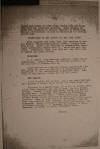
|
9. 31 July 1928.
Report on conditions on East Coast by
Walter Wilgus of Gen. McCoy's staff, p.
9.
"... claims and
wasted so much money buying land and
boasts that they are obviously amateurs.
Local Manager is named, Orr, formerly in
similar business in Bluefields.
The son of Cornelius is also in
Bluefields for several months stay.
¶ BLUEFIELDS TO SAN CARLOS VIA SAN
JUAN RIVER ¶ Best schooner
and river boat line operates by Carlos
Passos, (Bluefield’s Liberal leader),
jointly with Leon Frank. Rival
line operated by conservative family
(name unobtained, begins with C.), which
has mail contract. Complaints
along line that mail was often lost or
opened and money stolen. ¶
Greytown:
¶ A.J. Brand, only American
resident, drunk and incommunicado.
Arthur Paton, old British resident, ill.
He took boat to Granada with me. ¶
Conservatives at Greytown telling
inhabitants that Gen. McCoy had sold out
election to Conservatives for $1,000,000
in two installments of $500,000 each.
Same story at San Carlos, though the bid
was lower. ¶
San Carlos:
¶ I met Kennedy, who is O.K., and
a man named Reynolds, who operates a
cattle ranch across the Costa Rican
line. ¶ Reynolds is a
Californian, 55 or 60, in country seven
years, well educated, has son in navy.
He is a strong liberal. Claims to
know David Starr Jordah and David P.
Barrows well. Disagreed with
Barrows on Nicaraguan affairs during
latter visit. Claims credit for
having written Borah urging retention of
marines until after election. Said
he understood all Americans in
Philippines were very snobbish with
natives. Is writing a book on
Nicaragua. Seems friendly to
elections and guardia. Can be
reached through J.C. Kennedy, San
Carlos, or Lieut. Devereux, in charge of
marine detachment there. ¶
Wilgus"
|
|

|
31 July 1928
(0700).
Radiogram from Capt. Matteson,
Bluefields, to Major H. H. Utley, Puerto
Cabezas.
|
|
|
|
|
PREVIOUS
NEXT
|
|
|
|
|
|
|
|
